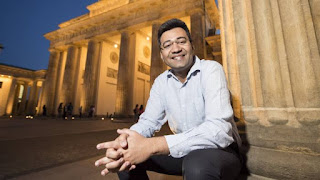
The Wharton School is placing a big bet on business analytics
The Wharton School‘s MBA program moved up its round one application deadline by a day to Sept. 18th for entry into the fall class of the 2018 intake. If you’re an early bird, you’ll get an interview invite or a rejection by Oct. 30, with a decision by Dec. 13th.
Wharton boasts three application rounds per year with three key dates for each round: Application Deadline, Interviews, and Decision Dates. For round two, the deadline is Jan. 3, 2019, with interview invitations going out on Feb. 7, and decisions on March 21st. For the third and final round, Wharton set a deadline of April 2nd, with interview invites released on April 18th, and decisions revealed on May 9th.
Wharton strongly advises candidates to apply in the first and second rounds and makes an app to its Lauder and JD/MBA programs mandatory in those rounds. “Space in the class becomes more limited for round 3 applicants, resulting in a more competitive round,” according to the school.
Wharton’s 2018-2019 MBA Application Deadlines
| Wharton Rounds | Application Deadline | Interview Invites | Decisions |
|---|---|---|---|
| Round One | September 18, 2018 | October 30, 2018 | December 13, 2018 |
| Round Two | January 3, 2019 | February 7, 2019 | March 21, 2019 |
| Round Three | April 2, 2019 | April 18, 2019 | May 9, 2019 |
To be considered for a round, you must submit a completed application by 5 p.m. Eastern Time (ET) on the day of the deadline. If you submit your application after the deadline for Round 1 or 2, it will be rolled into the next round. If you submit your application after the deadline for Round 3, it will not be accepted.
If you submit an application earlier in a round, you can confirm receipt via the online application system and will have more time to schedule an interview. Interviews are by invitation only. At any point, applicants can use the online application system to check the status of their applications.
WHARTON LAST YEAR RECEIVED 6,692 APPLICATIONS FOR 863 SEATS
In the 2017-2018 admissions cycle, Wharton received 6,692 applications for the 863 seats available in the Class of 2021. The school accepted 1,287 candidates for an overall acceptance rate of 19.2%.
The mean GMAT score for the incoming class was 730, with a range of 530 to 790, while the average undergraduate grade point average was 3.6. The mean GRE verbal score was 163, while the mean GRE quant score was 162, with an average writing score of 4.7.
Mean work experience, which ranged from zero to 14 years, was five full years.
ADVICE TO APPLICANTS FROM CLASS OF 2018 MBA GRADUATES:
“As with any school, try to reflect upon the reasons why you want to attend business school in the first place. Speak with students and alumni to hear a broad and diverse set of perspectives about Wharton. Reach out to affinity clubs you are interested in, get to know the DNA of the school, and bring those insights into your application process. A common misconception is that Wharton only selects candidates with quantitative and finance backgrounds. In reality, Wharton values all types of backgrounds and experiences. Don’t try to be someone you think the admissions office wants you to be.” — Tomer Meir, 2018 Wharton graduate now working at Amazon as a product manager
“There is no ‘typical’ Wharton student. It is our unique experiences and stories together that create this class and the opportunity to learn from each other. Focus on demonstrating who you are, how your goals fit with Wharton, and how you can bring that true self to this community. For me, being at Wharton means allowing all of our uniqueness’s to shape each other’s experiences. Now the question is, what does it mean for you?” — Prathama K Nabi, 2018 Wharton graduate now working at Barclays as an investment banking associate
“What you’re most ashamed of is often what has contributed most to who you are. When I was a teenager, I worked over 50 hours a week in restaurants, often 12 hours at a time. I vividly remember my feet stinging in my shoes while having to serve my peers, and teaching myself SAT math on my waitress pad whenever I had a break. I hid the fact that I worked in restaurants when I went to college because it wasn’t the typical high school experience, even though I’d often daydream about having my own restaurant one day. I started working again in restaurants at night while at Deloitte, and I embraced how it made me a better consultant on my MBA applications. My clients would often bond with me before anyone else on my team (even my managers) because I didn’t seek to impress with my intellect first, I approached them with an attitude of service. In restaurants, you leave your resume and your GPA at the door. That repeated lesson over years-and-years continues to impact me every day, and owning that part of myself before I applied to b-school allowed me to be my full self, confidently growing into a leader at Wharton and beyond.” — Natalie Neilson Edwards, 2018 Wharton graduate now building her own company, Broomstick Weddings, which provides wedding planning resources to brides from racial and cultural backgrounds often left out of traditional media
From Poets&Quants










